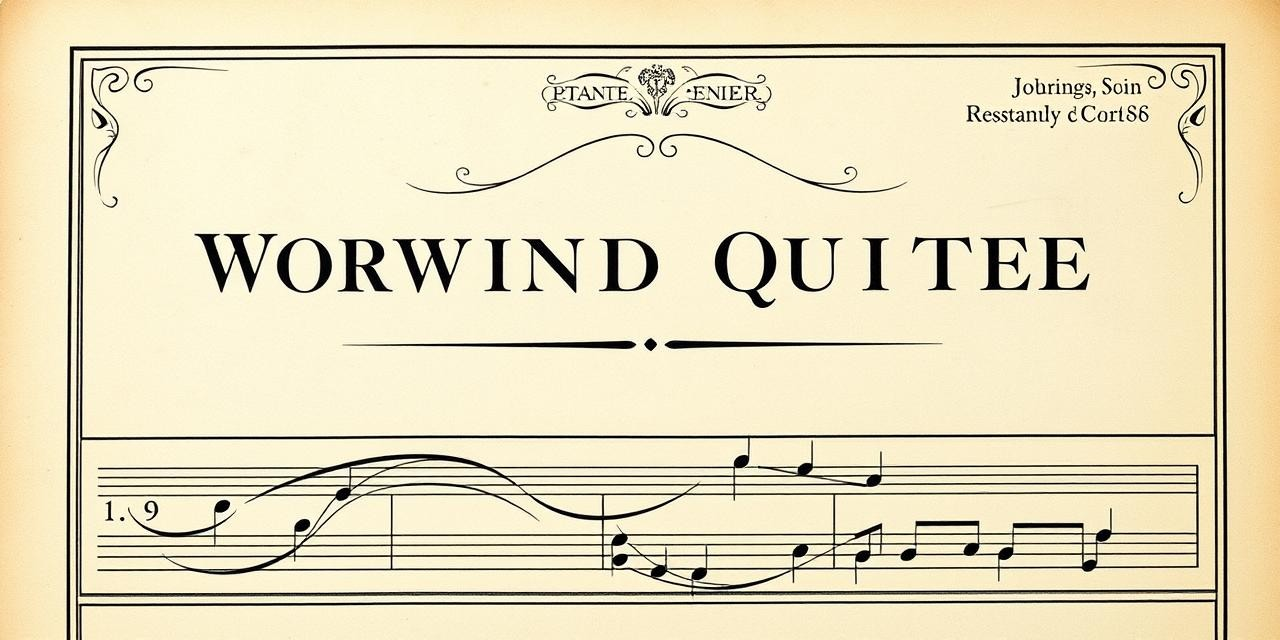The woodwind quintet: flute, oboe, clarinet, horn, and bassoon. It sounds simple, right? But this combination can create some truly amazing sounds. We all know the famous pieces – Nielsen, Hindemith, Barber. They’re classics for a reason! But there’s a whole world of other quintet music out there, just waiting to be discovered. As a musician and, well, a bit of a music history geek, I’ve spent years digging into these hidden gems. And I’m excited to share some of my absolute favorites with you.
Why Explore Beyond the Familiar?
Okay, so why should you even bother looking beyond the usual suspects? Good question! There are a few really compelling reasons. First, it completely changes how you think about what a quintet can do. These less-known pieces often break the rules. They mess with the form, the harmonies, and how the instruments are played. It’s ear-opening, trust me. Second, it gives performers a chance to really show off. Unfamiliar music forces you to dig deeper, to be more creative, to really think. And most importantly? It’s about keeping the music of deserving composers alive. Their voices need to be heard!

Unearthing the Gems: Some Personal Recommendations
So, where do you even start? Glad you asked! Here are a few pieces that I keep coming back to. Each one offers something totally unique to the woodwind quintet world:
- August Klughardt’s Quintet in C major, Op. 79: Seriously underrated! Klughardt’s quintet is a late-Romantic masterpiece. Think Brahms, but for winds. It’s full of gorgeous harmonies and melodies that just soar. Plus, the way he uses each instrument’s unique sound is just brilliant. And the slow movement? Pure. Beauty.
- Jacques Ibert’s Trois Pièces Brèves: Okay, okay, maybe not completely unknown. But Ibert’s Trois Pièces Brèves often gets passed over for more “serious” stuff. Big mistake! It’s witty, charming, and just plain fun. Each movement is like a tiny jewel, packed with playful tunes and clever writing. Perfect for an encore. Guaranteed smiles.
- Franz Danzi’s Quintets: Danzi loved writing for wind quintet. And a lot of his work is still waiting to be discovered. Honestly, they’re all worth checking out. But his quintets are a particularly great place to start. They’re charming, well-made, and full of catchy melodies. Danzi really knew his Classical stuff!
- Paul Taffanel’s Quintet in G minor: Taffanel is famous as a flutist. But his quintet is a major contribution to the repertoire. It’s more substantial than Ibert’s, with more drama and emotion. He really understood how to write for each instrument. The result? Virtuosic and deeply satisfying.
Beyond the Recommendations: A Call to Exploration
These are just a few ideas to get you started. The world of lesser-known woodwind quintet music is HUGE. It’s out there waiting. Don’t be afraid to dig around in library archives, search online databases, and dust off those forgotten scores. Talk to other musicians, share what you find, and create your own programs of hidden gems. Trust me, it’s worth it.
The Importance of Context and Performance Practice
So, you’ve found a cool, obscure piece. Awesome! Now what? When you’re diving into these lesser-known works, it’s super important to think about when they were written. What was the composer listening to? What were the big musical trends at the time? Who was the music for? Understanding the historical context can really help you understand the music itself. Also, think about performance practice. How did musicians play back then? What were the conventions? Paying attention to these details can really bring the music to life.
Finding the Music: Resources and Strategies
Okay, let’s be real. Finding this stuff can be tricky. A lot of these pieces aren’t exactly bestsellers. They’re not always easy to find in standard editions or recordings. But don’t give up! With a little effort, you can unearth some amazing things. Here’s how:
- University Libraries and Archives: These places are goldmines. They often have huge collections of sheet music, including rare and out-of-print stuff.
- Online Music Databases: Check out IMSLP (International Music Score Library Project). It’s a free online library with tons of public domain scores.
- Specialized Music Publishers: Some publishers focus on lesser-known repertoire. They might have editions of works you can’t find anywhere else.
- Networking with Other Musicians: Talk to other woodwind players, conductors, and music nerds. They might have some great recommendations.
The Future of the Repertoire
The future of woodwind quintet music is in our hands! By seeking out and performing these lesser-known works, we can make sure they don’t disappear. We can also inspire new composers to write for this amazing ensemble, pushing the repertoire in exciting new directions. It’s a responsibility, sure. But it’s also a privilege. We get to be part of this ongoing process of discovery and renewal.
A Final Thought
So, next time you’re looking for something new to play or listen to, take a chance! Go beyond the familiar. Explore the hidden gems of the woodwind quintet repertoire. Who knows? You might just find your new favorite piece.

